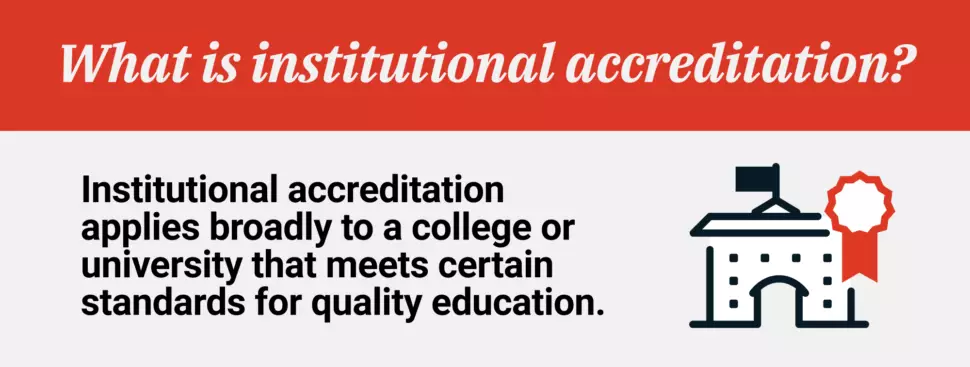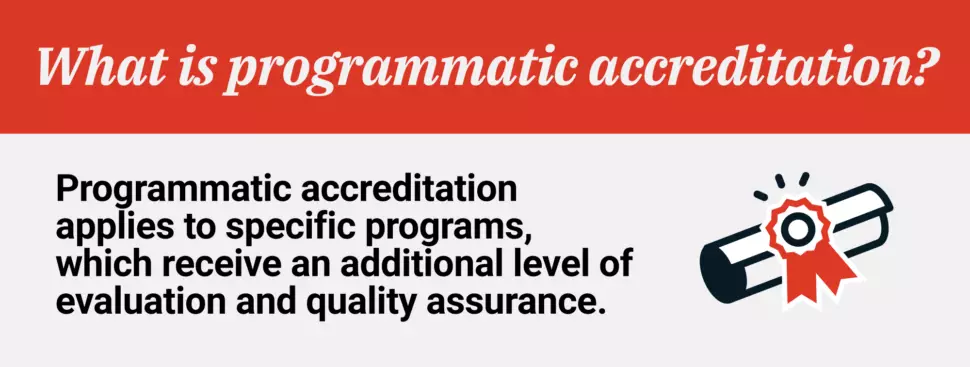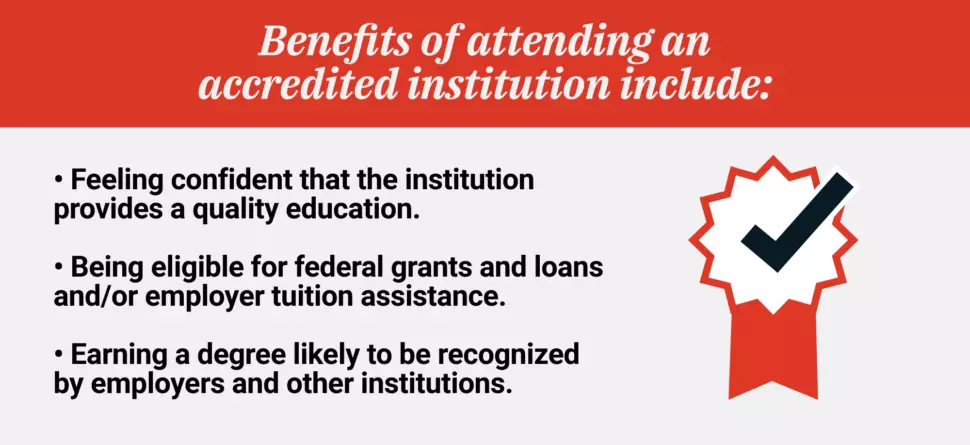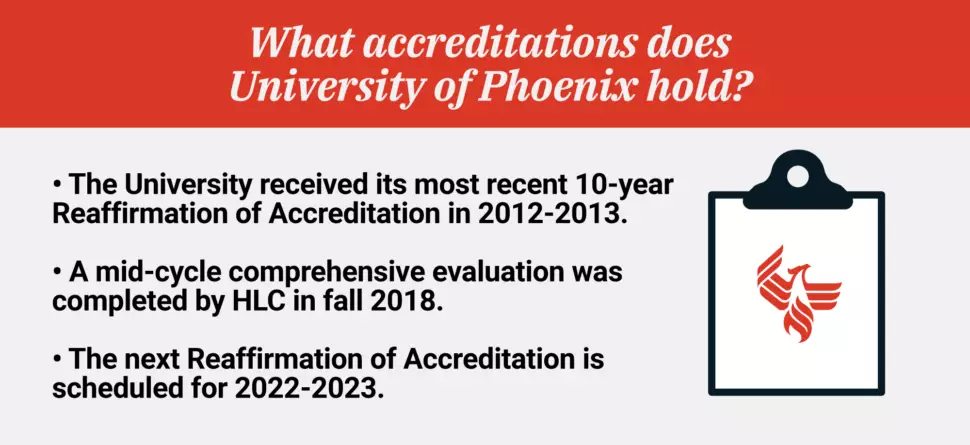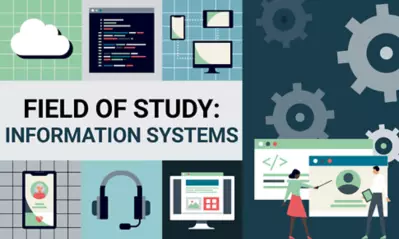Why college accreditation matters and how to find the right college for you
By Laurie Davies and Brian Fairbanks
At a glance
- Institutional accreditation validates the quality of an institution and evaluates multiple aspects, including its academic offerings, governance and administration, mission, finances, and resources.
- Programmatic, or specialized, accreditation validates the quality of a specific academic college or school (e.g., business, nursing, education, counseling) and its programs.
- Historically, regional accreditation agencies such as the Higher Learning Commission (HLC) are recognized by the U.S. Department of Education to accredit degree granting colleges and universities.
More than 100 degrees and certificate options — 90% of which are in growing fields.
College accreditation is one of those big, academic-sounding words that sounds intimidating. A college or university’s accreditation status can play into everything from the quality of your education to financial aid eligibility to how employers view your degree.
Yeah, it’s that important.
So, what exactly is accreditation and who does it? What are the different types of accreditation, like regional accreditation and programmatic accreditation? And how do colleges and programs earn it?
We’ll break all these questions down. But first, the question you (rightly!) care about most: What does accreditation mean for me as I pursue my degree?
Students who attend accredited institutions for a degree can:
- Be confident that the institution provides a quality education
- Be eligible for federal grants and loans (program specific)
What is college accreditation?
When a school or program says, "We are accredited," it is saying it has a seal of approval or a good rating, according to the Council for Higher Education Accreditation (CHEA). To get and keep the seal or rating, every part of a school or a program is examined and evaluated by experts.
Generally, accreditation is the process of reviewing colleges, universities, institutions and programs to judge their educational quality — how well they serve students and society. The result of the process, if successful, is the award of "accredited status."
Types of college accreditation
There are two types of higher education accreditation: institutional and programmatic. Let’s define each:
Institutional accreditation (formerly, regional accreditation)
Institutional accreditation is an accreditation that applies broadly to a college or university, rather than specific programs. This type of accreditation serves as assurance that a university meets the quality of standards required to effectively educate its students and has processes in place to continually evaluate and improve its offerings.
Programmatic accreditation
In addition to institutional accreditation, specific programs within an institution may also be accredited. Known as programmatic or specialized accreditation, such programs receive an additional level of evaluation and quality assurance.
Programmatic accreditation, which focuses especially on the curriculum and how it is benchmarked against certain criteria to meet industry standards and prepare students (including online learners) for their industry, can be an important factor for students seeking a degree.
For example, a business program accredited by the Accreditation Council for Business Schools and Programs (ACBSP) would offer a reputable representation of quality and quality assurance that might set it apart from a non-accredited program.
State governments may require graduation from a programmatically accredited program in order to be eligible for licensure in some professional fields.
Other programmatic accreditors (or agencies that administer accreditation) include:
- Commission on Accreditation of Healthcare Management Education (CAHME)
- Commission on Collegiate Nursing Education (CCNE)
- Council for Accreditation of Counseling and Related Educational Programs (CACREP)
- Council for the Accreditation of Educator Preparation (CAEP)
Why is college accreditation important?
Institutional and programmatic accreditation are critical determiners of the quality of an institution or program. Degree-seekers should ensure that the institutions they are considering are accredited, whether they're pursuing online degrees or an in-person program. Here are a few additional reasons why accreditation matters:
- Encourages confidence that an institution's or program’s presentation of the education it provides is fair and accurate, including the description of services available to students and the accomplishments of its graduates.
- Assures that a neutral, external party (the accrediting organization) has reviewed the quality of education provided and has found it to be satisfactory, based upon appropriate peer expertise.
- Confirms that institutions and programs have processes in place to meet changes in thinking within the academy and in the public’s expectations.
- Provides for eligible students to have access to federal financial aid if they attend institutions accredited by accreditors that are recognized by the U.S. Department of Education.
- Assists with the transfer of credits among institutions or admission to graduate school, with student mobility more likely to be successful among accredited institutions as compared to unaccredited institutions. Always remember, transferability of credit is at the discretion of the receiving institution.
- Graduation from an accredited program may be required by a state to be eligible for licensure in a particular profession.
- Signals to prospective employers that an educational program has met widely accepted educational standards.
How do colleges and programs get accredited?
Accreditation is carried out through non-governmental organizations created in whole or in part by the higher education community. In several fields, especially the health professions, graduation from an accredited program may be required to be eligible for a license to practice in a particular state.
All accrediting organizations create and use specific standards both to ensure that institutions and programs meet threshold expectations of quality and that they improve over time. These standards address key areas such as faculty, student support services, finance and facilities, curricula, and student learning outcomes.
Accrediting organizations use common practices, including a self-review by the institution or program against the standards, an on-site visit by an evaluation team of peer experts and a subsequent review and decision by the accrediting body about accredited status. This review is repeated every three to 10 years if the institution or program is to sustain its accreditation.
Does accreditation matter for online colleges?
Yes, accreditation matters for any college or university whether it’s online, on campus or a hybrid of both. In fact, accreditation for online colleges and online programs is just as important as it is for campus-based colleges and programs. The same expectations for quality are applied, even if the models of delivery are different. (This goes for for-profit and nonprofit educational institutions too.)
Accreditation is important, according to the Higher Learning Commission (hlccommission.org), an accreditor recognized by the U.S. Department of Education, because it ensures that a student’s education is recognized as high quality across the board, whether that’s by an employer, with a licensing board or at another university.
How does the college accreditation process work?
When a school decides to pursue accreditation, it may contact an accreditation agency as part of a voluntary but binding system. The independent auditors (or agents) work together to review whether the higher learning institution has met the agency’s standards for accreditation.
Not all accreditors are created equal, so it’s important to do your homework here, too. Some accrediting agencies apply more scrutiny than others, and each accrediting agency’s process is nuanced in terms of criteria and requirements.
In fact, according to the educational services company Peterson’s, "Since accrediting agencies vary in their quality standards, some are considered more prestigious than others. Which one a school pursues depends on what standard of quality the school hopes to achieve and to maintain."
Many accreditors implement:
- A regular cycle of extensive self-evaluation
- A comprehensive evaluation (evidence-based) by members of peer institutions or programs
- Ongoing reporting
- A focus on continuous quality improvement
It’s important that a school be accredited by an agency that is itself credible. The U.S. Department of Education recognizes certain accreditors, including the Higher Learning Commission (HLC; hlccommission.org), which accredits various campus-based and online schools, including University of Phoenix. Another good resource is the Council for Higher Education Accreditation (CHEA), which recognizes reputable institutional and programmatic accrediting organizations.
How do I verify whether an institution and/or its programs are accredited?
It’s important that a school be accredited by an accrediting agency that is itself credible. The U.S. Department of Education recognizes certain accreditors, including the Higher Learning Commission (hlccommission.org ), which accredits various campus-based and online educational institutions, including University of Phoenix. Another good resource is the Council for Higher Education Accreditation (CHEA).CHEA recognizes an extensive list of accrediting bodies, but there are seven that typically accredit colleges and universities in the U.S.
You can look up your potential or current school’s accreditation by searching the U.S. Department of Education’s Office of Postsecondary Education’s accreditation database or CHEA. You may want to note how long an institution has been accredited as well.
For some students, programmatic or specialized accreditation may also be important. Specific programs, such as business degree programs, can be accredited. If you’re thinking of applying for a nursing, education, healthcare, counseling or business program at a certain school, see if those departments offer programs that have programmatic accreditation.
What accreditations does University of Phoenix hold?
Since 1978, University of Phoenix has been continuously accredited by the Higher Learning Commission (hlcommission.org).
Both CHEA and the U.S. Department of Education recognize HLC as an accrediting organization.
- The University received its most recent 10-year Reaffirmation of Accreditation in 2012-2013.
- HLC completed a mid-cycle comprehensive evaluation in fall 2018.
- The next Reaffirmation of Accreditation is scheduled for 2022-2023.
HLC works with institutions "to define, develop and implement comprehensive strategies for institutional improvement." It also offers professional development training for colleges to strengthen the quality of their programs and curriculum, faculty, research and scholarship and support services.
In addition to University of Phoenix’s institutional accreditation, the following University of Phoenix programs are among those that have received programmatic accreditation. A full list of accredited programs is available in the University’s Academic Annual Report.
- Master of Science in Counseling
- Bachelor of Science in Accounting
- Bachelor of Science in Business
- Master of Business Administration
- Master of Health Administration
- Master of Science in Nursing programs
Finding an accredited online college that’s right for you
If you’ve been looking for an accredited online university that allows you to learn on your own schedule, University of Phoenix may be a great option for you. The University offers online students flexible schedules, fixed-rate tuition and competency-based programs that allow working professionals to leverage their experience to earn a degree faster and for less money.
The University offers online degree programs in a variety of fields, including business administration, information technology, healthcare management and criminal justice. Distance learners can choose from associate, bachelor's and graduate degree options (including online master's and doctoral programs) at this accredited University. A number of professional development and graduate certificates are also available.
Becoming an online student offers distinct benefits to nontraditional students. Online courses can be completed one at a time, for example, for easier integration with an individual's pre-existing commitments. The requirements and expenses of on-campus living are eliminated. And out-of-state considerations are removed.
Visit phoenix.edu/about/accreditation to learn more about the University’s accreditation.
What can I do with an information systems degree? Careers, tips and more
Online Degrees
November 15, 2021 • 7 minutes
Computer Science vs. Information Technology vs. Cybersecurity
Online Degrees
May 25, 2021 • 8 minute read

